articles
Cyber threat insights with Crowdsec, VictoriaMetrics and Grafana
Brewing a low-coding open source cyber threats analysis solution based on Crowdsec 1, VictoriaMetrics 2, and Grafana 3.
Publish Date
- 2024-08-10
Weakness in Crowdsec OpenMetrics statistics
Out of the box, each Crowdsec instance can provide the statistics in the Prometheus 4 or OpenMetrics 5 format about its engine status, such as:
- decisions
- alerts
- etc.
All possible data slices are explained in the Crowdec metrics documentation 6. There are official Grafana dashboards for Crowdsec 7, but these metrics do not contain the information that most operators are interested in, such as cyber threat statistics. For example, active decisions and alerts contain only the scenario metrics:
~> curl -s localhost:6060/metrics | egrep 'cs_alerts{|cs_active_decisions{'
cs_active_decisions{action="ban",origin="crowdsec",reason="crowdsecurity/ssh-bf"} 1
cs_alerts{reason="crowdsecurity/ssh-bf"} 24
cs_alerts{reason="crowdsecurity/ssh-bf_user-enum"} 5
cs_alerts{reason="crowdsecurity/ssh-slow-bf"} 11
To obtain cyber threat statistics, Crowdsec requires the use of Console 8 as the central management system:
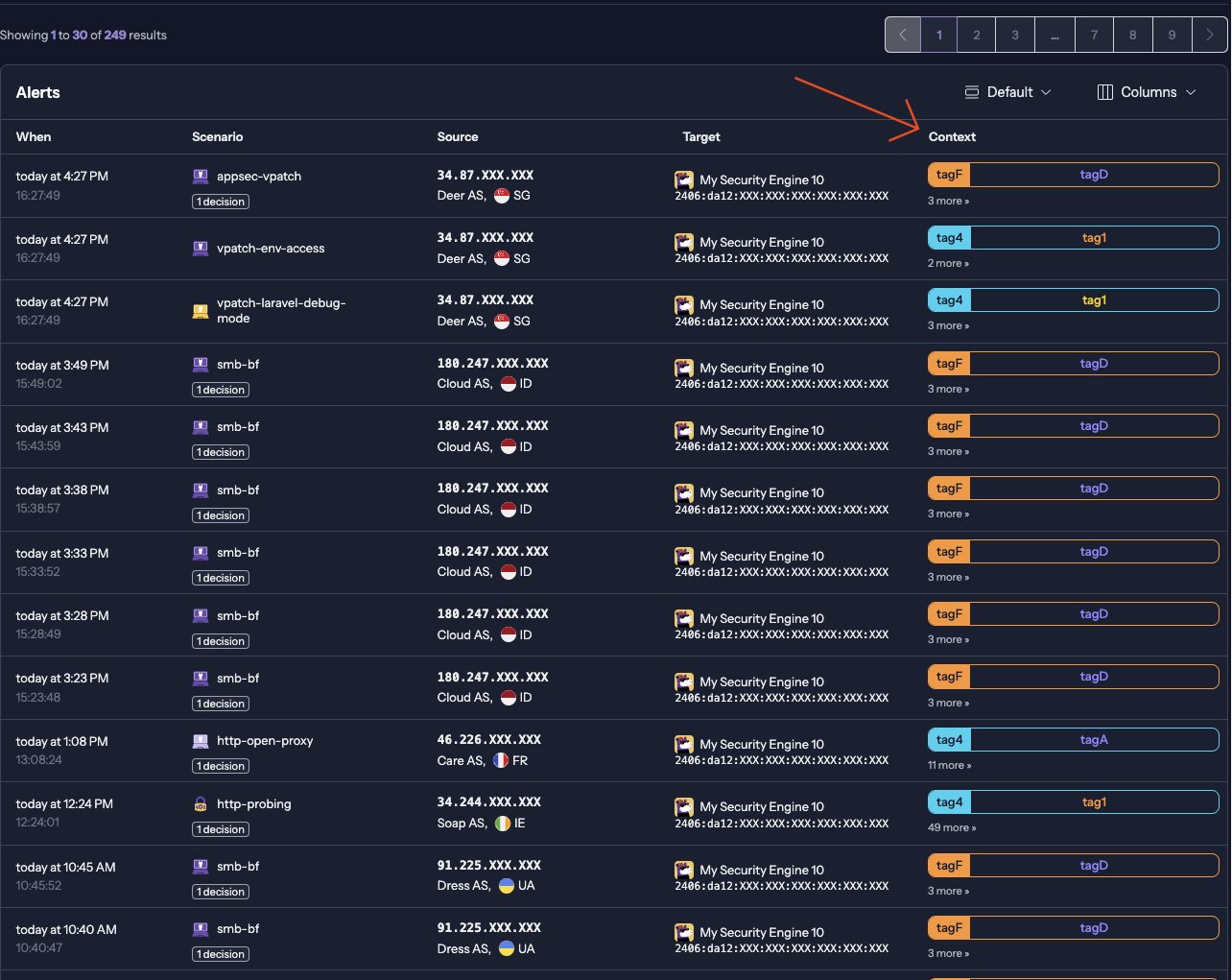
Also, the Metabase 9 can provide this statistics with cscli dashboard 10:
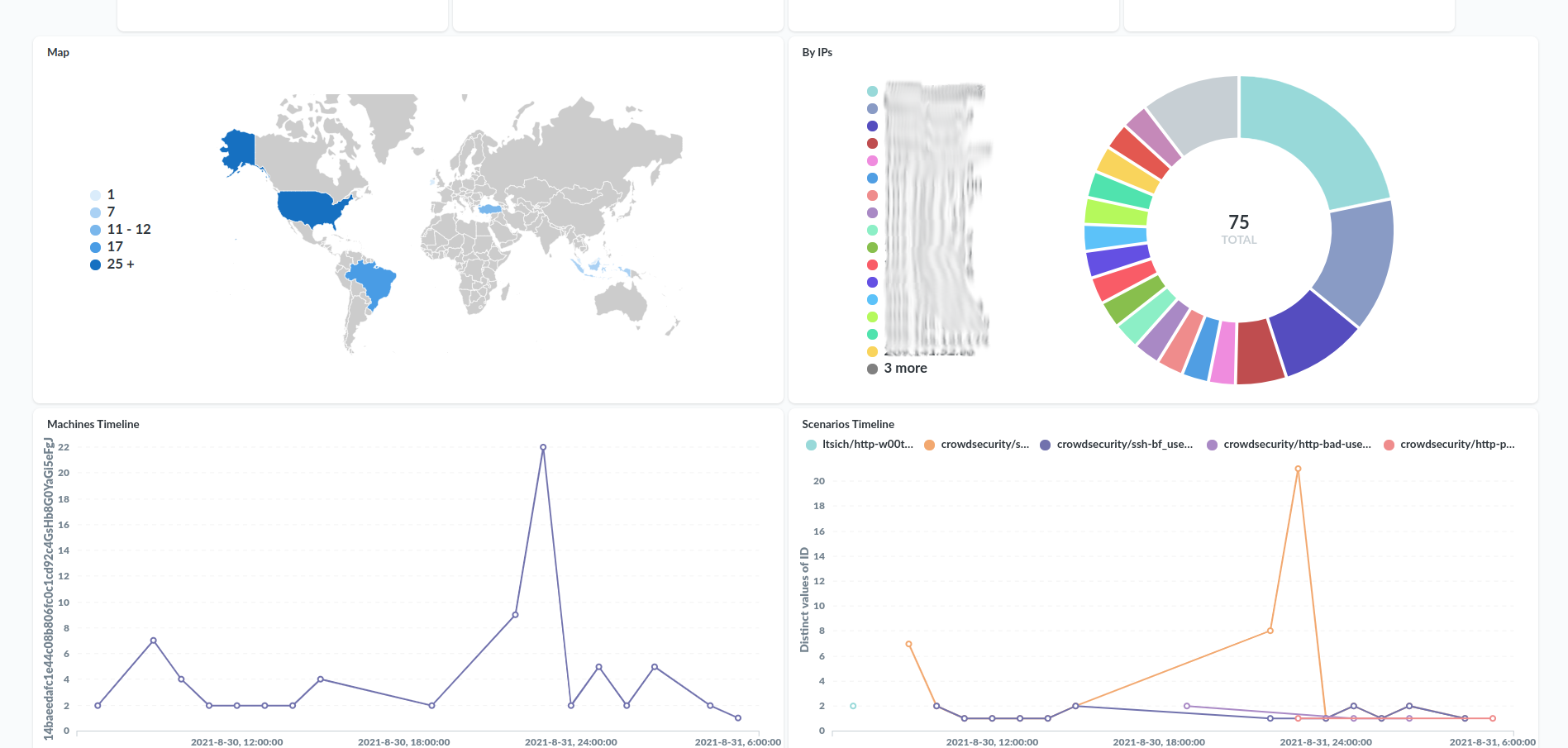
The 1st option requires binding to the centralized Crowdsec ecosystem and feeding it with enterprise infrastructure data, the 2nd requires to start Metabase on every existing Crowdsec node and looks mostly unmanageable.
Different solution
The other self-hosted low-code 11 solution with the almost same results can be reached by integration of Crowdsec with VictoriaMetrics. Later the stored data easily can be represented in Grafana:
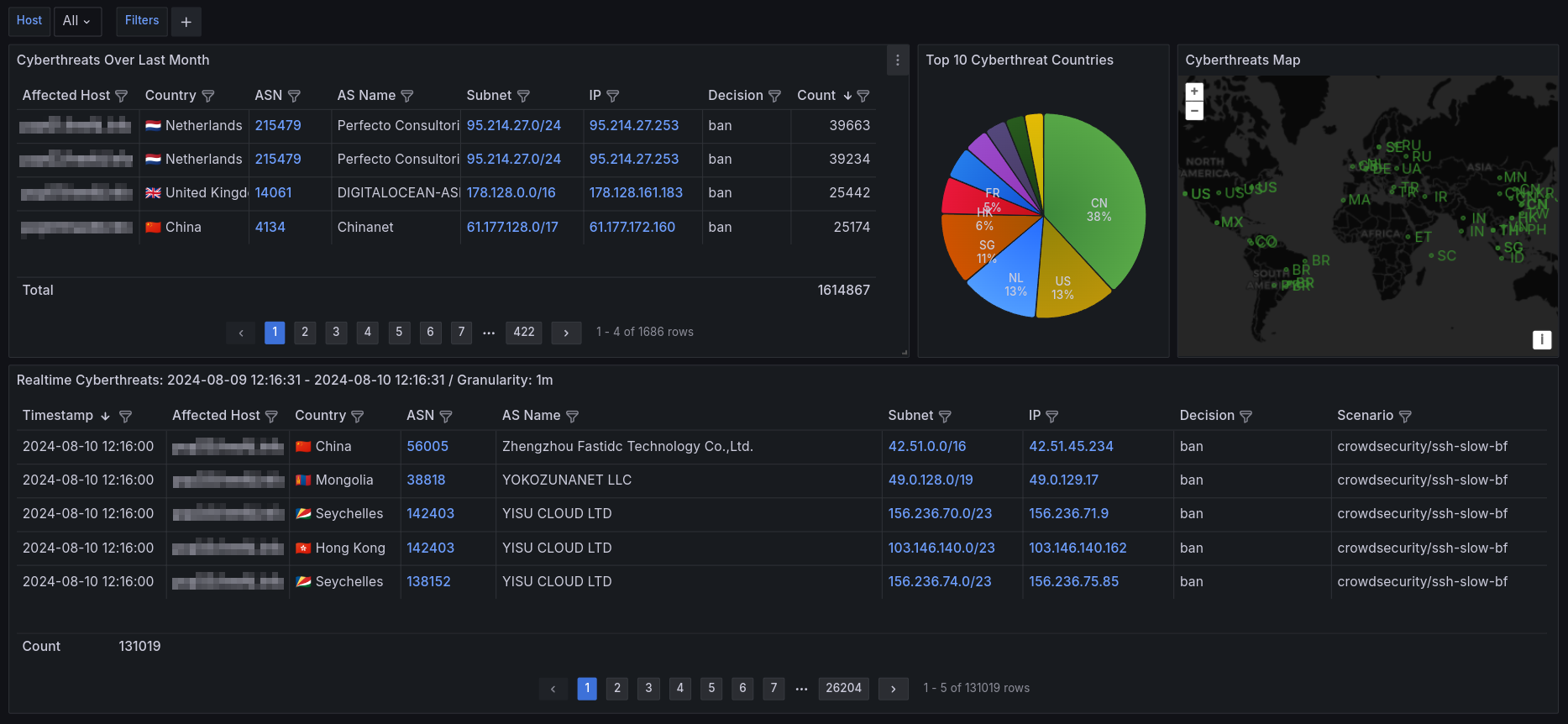
You can download this dashboard at Grafana dashboards.
There are also available all powerful Grafana controls for the analysis:
- Data filtering
- Data links
- Value Mapping
- etc.
For example, dynamic filtering the entire dashboard by a single country simply clicking on chart:
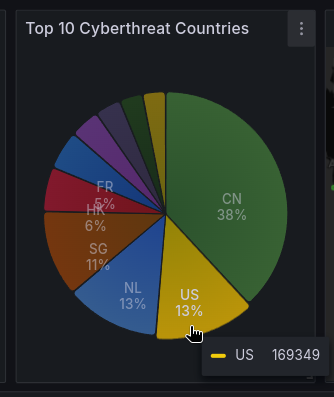
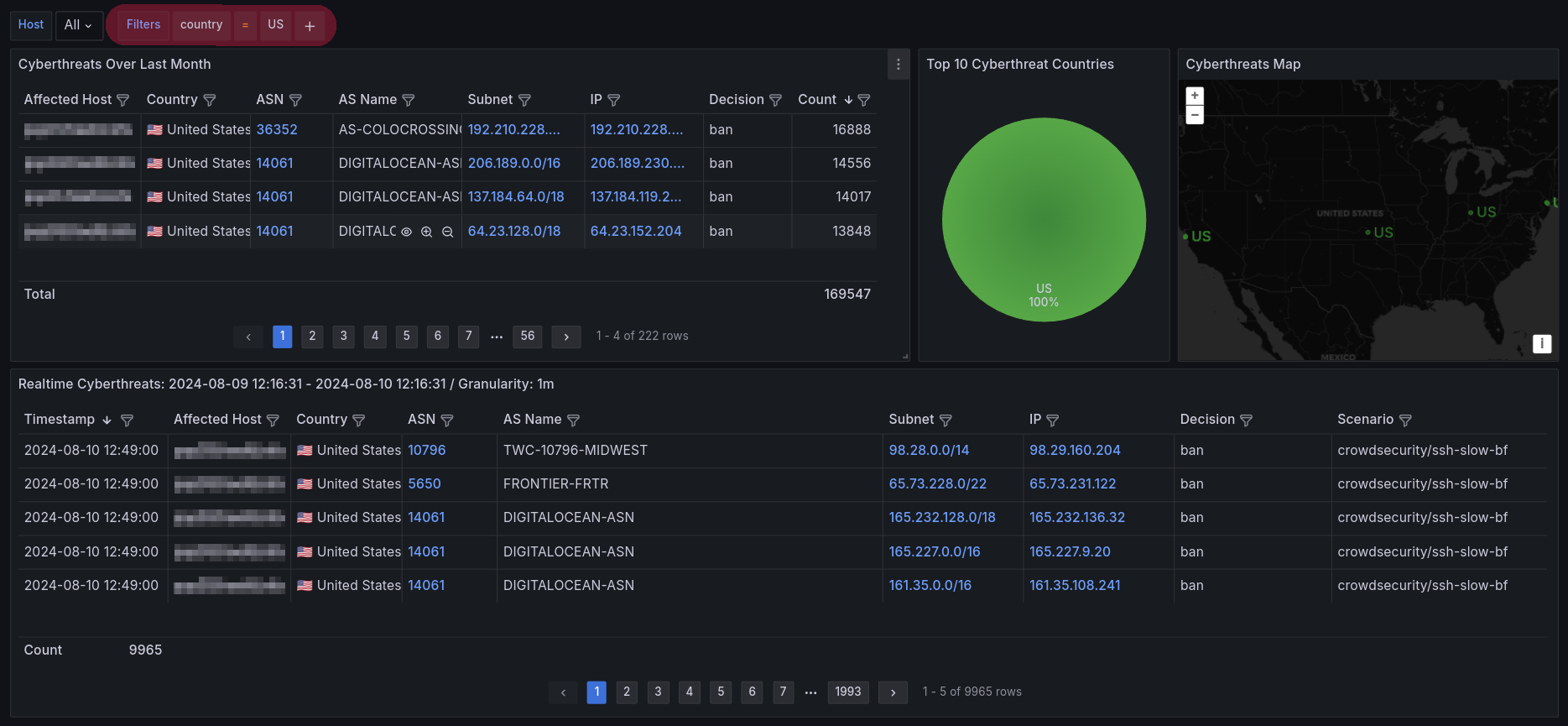
Additional data links are helping with analysis of a particular ASN record with information from RIRs 12:
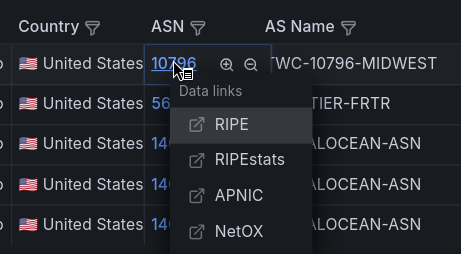
The subnet information could be investigated by both information from RIR and online security databases such as Crowdsec CTI 13, Shodan 14, Censys 15, Criminal IP 16, and similar:
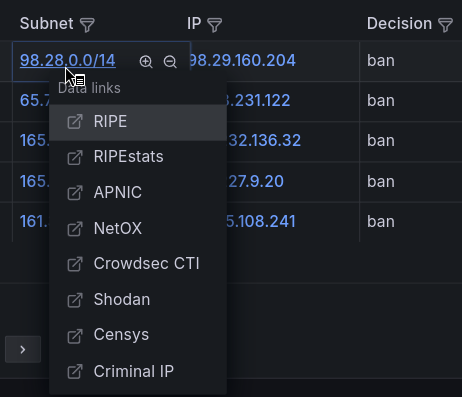
The IP address can only be analyzed with online security databases:
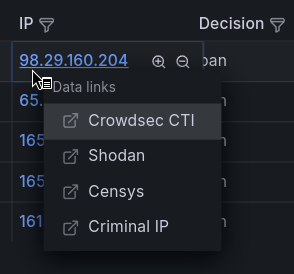
Also there is a geomap with coordinates found by the built-in Crowdsec GeoIP module 17 based on Maxmind Lite 18 databases.
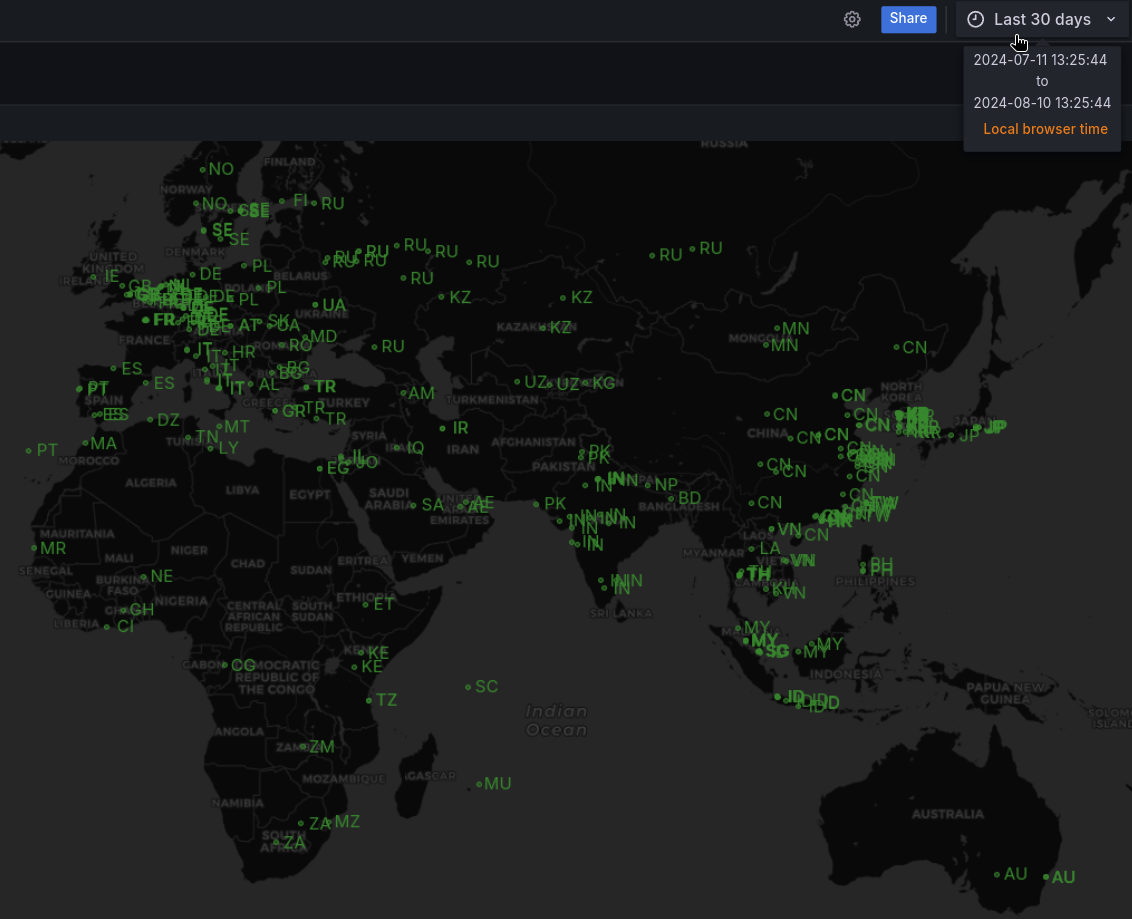
Integration steps
Overall integration and call-flow landscape can be depicted as follows:
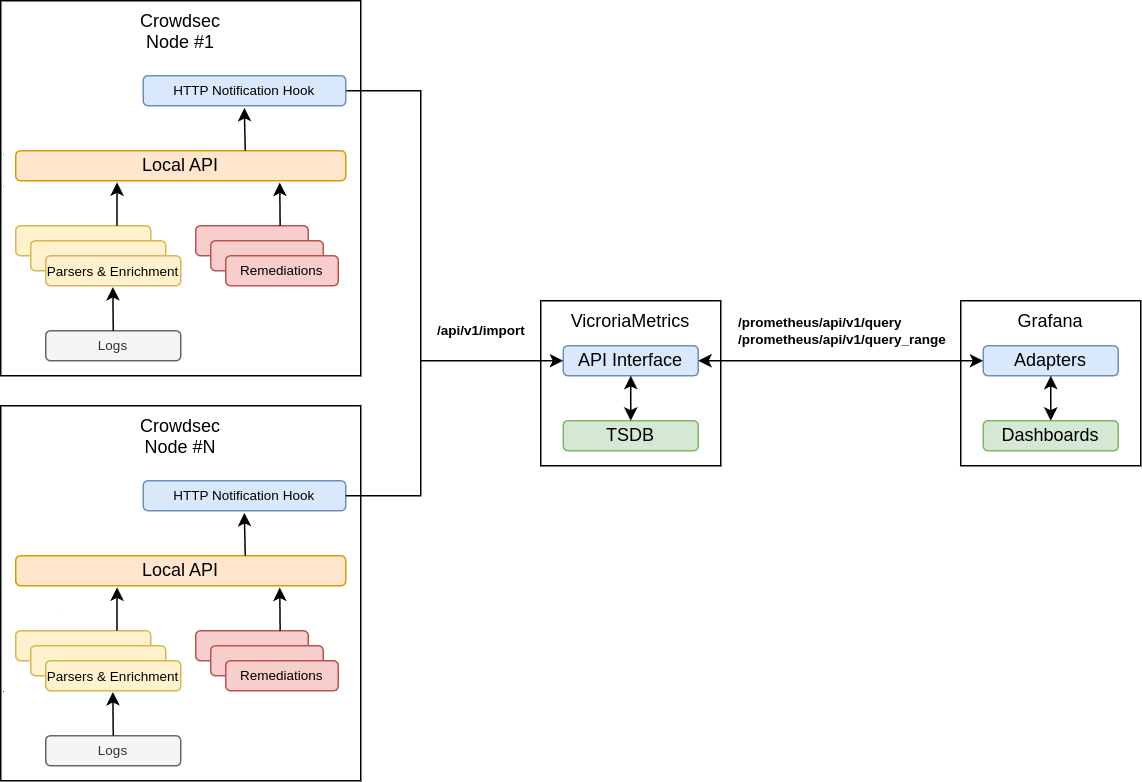
As shown above, the /api/v1/import 19 endpoint on VictoriaMetrics instance is utilized to collect the data from Crowdsec nodes, it accepts JSON Lines 20 text format.
The coding skills are not required to make all this work, only the template configuration for Crowdsec HTTP notification plugin 21 is needed within the /path/to/notifications/http.yaml file:
type: http
name: http_default
log_level: info
format: >
{{- range $Alert := . -}}
{{- range .Decisions -}}
{"metric":{"__name__":"<METRIC_NAME>","instance":"<INSTANCE_NAME>","country":"{{$Alert.Source.Cn}}","asname":"{{$Alert.Source.AsName}}","asnumber":"{{$Alert.Source.AsNumber}}","latitude":"{{$Alert.Source.Latitude}}","longitude":"{{$Alert.Source.Longitude}}","iprange":"{{$Alert.Source.Range}}","scenario":"{{.Scenario}}","type":"{{.Type}}","duration":"{{.Duration}}","scope":"{{.Scope}}","ip":"{{.Value}}"},"values": [1],"timestamps":[{{now|unixEpoch}}000]}
{{- end }}
{{- end -}}
url: <VICTORIAMETRICS_INSTANCE_PROTO>://<VICTORIAMETRICS_INSTANCE>/api/v1/import
method: POST
headers:
Content-Type: application/json
Authorization: "<AUTH_STRING>"
Where <VAR_NAME> are placeholders required to be filled with real data:
<METRIC_NAME>- the name of the metric being produced, the current implementation containscs_lapi_decision.<INSTANCE_NAME>- the name of the instance that sends this data, e.g.host00.domain.tld.<VICTORIAMETRICS_INSTANCE_PROTO>- the VictoriaMetrics instance’s API protocol,httporhttps.<VICTORIAMETRICS_INSTANCE>- domain name or IP of the VictoriaMetrics instance.<AUTH_STRING>- the contents of the Authorization header 22, for example, could be Basic Authorization 23 or OAuth2 Bearer 24. If authorization does not require, the entireAuthorizationheader needs to be removed from template.
Each time the template produces a value of 1, which means one record. This is the trick of converting Log records to Metric records. For more information on observability signals please read Observability Whitepaper 25.
And since the value is 1 each time, it’s easy to count, summarize, and perform other simple math operations for these records.
Finally, the following example JSON payload will be rendered by this template as a single line, since it strictly needs to be compatible with JSON Lines, here it is formatted for clarity:
{
"metric": {
"__name__": "cs_lapi_decision",
"instance": "host00.domain.tld",
"country": "SG",
"asname": "Tencent Building, Kejizhongyi Avenue",
"asnumber": "132203",
"latitude": "1.2868",
"longitude": "103.8503",
"iprange": "129.226.0.0/16",
"scenario": "crowdsecurity/ssh-slow-bf",
"type": "ban",
"duration": "4h",
"scope": "Ip",
"ip": "129.226.84.230"
},
"values": [1],
"timestamps": [1723013301000]
}
In VictoriaMertics, this will be shown as a sample of cs_lapi_decision time series:
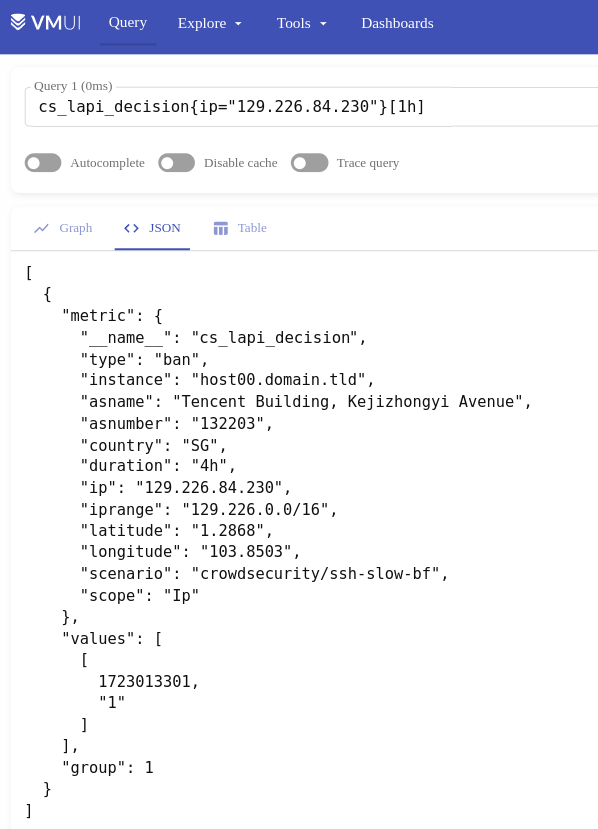
Please do not forget to enable HTTP notifications plugin in the main Crowdsec configuration config.yaml:
...
config_paths:
...
notification_dir: /path/to/notifications/
...
api:
...
server:
...
profiles_path: /path/to/profiles.yaml
...
and profiles.yaml:
...
notifications:
...
- http_default
...
...
References
1. Crowdsec - Real-time & crowdsourced protection against aggressive IPs ↩
2. VictoriaMetrics - High-performance, open source time series database & monitoring solution ↩
3. Grafana - Multi-platform open source analytics and interactive visualization web application ↩
4. Prometheus - Open source systems monitoring and alerting toolkit ↩
5. OpenMetrics - Standard for transmitting cloud-native metrics at scale ↩
6. Crowdec metrics documentation ↩
7. Grafana dashboards for Crowdsec ↩
8. CrowdSec Console - Central management web interface ↩
9. Metabase - Open source business intelligence platform ↩
10. cscli dashboard ↩
11. low-code - Mostly visual approach to software development ↩
12. RIR - Regional Internet registry ↩
13. Crowdsec CTI - OSINT search engine specialized in attack surface assessment and threat hunting ↩
14. Shodan - OSINT search engine specialized in attack surface assessment and threat hunting ↩
15. Censys - OSINT search engine specialized in attack surface assessment and threat hunting ↩
16. Criminal IP - OSINT search engine specialized in attack surface assessment and threat hunting ↩
17. Crowdsec GeoIP module - GeoIP module relies on geolite database to provide enrichment on source ip ↩
18. Maxmind Lite - Less accurate free IP geolocation databases ↩
19. Import data to VictoriaMetrics in JSON line format ↩
20. JSON Lines - Convenient format for storing structured data that may be processed one record at a time ↩
21. Crowdsec HTTP notification plugin ↩
22. HTTP Authorization header ↩
23. HTTP Basic Authorization ↩
24. HTTP OAuth2 Authentication ↩
25. Observability Whitepaper ↩